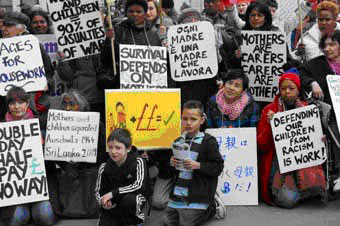 Working class women continue to be the hardest hit by the ConDem government’s austerity measures, particularly those with children. Unemployment and underemployment, rising childcare prices, and cuts to benefits and services are leading to rapidly declining living standards and increasing numbers of women living in poverty. This is set to intensify as the cuts deepen and increase.
Working class women continue to be the hardest hit by the ConDem government’s austerity measures, particularly those with children. Unemployment and underemployment, rising childcare prices, and cuts to benefits and services are leading to rapidly declining living standards and increasing numbers of women living in poverty. This is set to intensify as the cuts deepen and increase.
94% of Child Benefit claimants and 92% of single parents are women. Women are far more likely to have insecure and low-paid positions in the workforce, with 5.86 million women working part-time, compared with 2.01 men. 65% of public sector workers, a vulnerable sector, are women, with women forming over 90% of part-time public sector workers earning under £15,000 a year. This means that the most oppressed are the hardest hit: for example a part-time care assistant on a low wage faces not only the very real threat of unemployment, but also changes to child benefit allowances, tax credits, childcare costs, wider benefit changes such as housing benefit, and reductions in family and women’s services. The impact of austerity measures on women is a particularly savage aspect of the wider and unprecedented attacks on the working class as a whole.
As the crisis deepens, so does the risk not only of unemployment but also of underemployment. Women’s unemployment is stands at 7.8%, the highest level for nineteen years. So far, women working in the public sector have been particularly vulnerable to job cuts; 100% of job losses in 19 Local Authorities were dealt to women. In addition, there are increasing numbers of women who are underemployed, facing limited hours, low pay and insecurity. Over the past year, the number of part-time female workers needing to increase their hours but unable to has risen by 11%. In London, the number of women forced to work part-time rather than full-time has more than doubled since the end of 2007. Crucially, for all women this is accompanied by a steady erosion of working conditions. Examples of recent changes include those for building society staff who reported being forced to work on a Saturday when requesting flexible work for care reasons. Care workers, 85% of whom are women, have protested against cuts to pay on top of zero-hour contracts.
The slashing of benefits forces living standards down further. Changes to Working Tax Credit are forcing working parents to increase their increase their joint working hours from 16 to 24 to qualify for support. The stakes are high – low-paid families risk losing an average £3,870 in tax credits. But where is the work? Overall unemployment stands at 8.1%, with an average of 23 applicants for each job, and families report being simply unable to get the extra hours they need. The changes mean that four out of ten working families living in extreme poverty have considered giving up work simply to make ends meet.
At the same time, increasingly unaffordable childcare is forcing more and more women out of work. The story of one young mother is increasingly common: “I have not gone back to work. It is not by choice. My salary would have the house running at a loss with two children under two years old”. The average cost of childcareis now over £100 for 25 hours, with taverage yearly expenditure for a child under two standing at £5,103. David Cameron recently explained, in an attempt to appear understanding whilst simultaneously justifying the cuts: ‘Of course this is hard […] Childcare can be incredibly awkward. Sometimes the hours just don’t fit. But even if there’s no scope for actually working, there should at least be for preparing to work: getting down to the job centre; writing a CV; learning new skills.’ This simply ignores the reality for working class women, and the ‘awkward’ problem of childcare has been made worse by cuts to Sure Start Children’s Centres. The centres aim to offer affordable childcare, family support and advice on jobs, training and health and are used mainly by women.The funding, which David Cameron promised to ring-fence, has been cut by 25%, with what remains merged into an ‘Early Intervention Grant’ which also has to stretch to cover mental health and youth crime services.
At a time in which one in five women from low-income families are already missing meals in order to feed their children, the Sure Start Maternity Grant has been largely restricted to the first child, a cut of £500. David Cameron’s words yet again ring hollow when he claims that ‘women should be able to decide freely, and for themselves, whether, when and how many children they have.’ One particularly vicious benefit change that targets single parents in particular is the requirement for single parents to move from Income Support to Jobseeker’s Allowance – and thereby ‘make themselves available for work’ at an ever earlier age.. The reforms, initiated by the Labour Party, which have affected over 111,000 single parents, set the age of the youngest child at five. Proposals are now in place to force parents to engage in searching for work from a child’s first birthday. The introduction of Universal Credit in October 2013 will only serve to intensify the attacks already taking place, attacks which must continue to be exposed and resisted.




